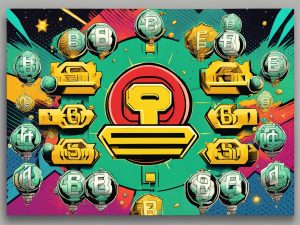Coffee Talk: SEC, eToro, and the Curious Case of Ether
You know, sitting here sipping our coffees, I can’t help but think about the wild world of cryptocurrency and its constant twists and turns. Just when you think you’ve wrapped your head around it, boom—a new development comes along and shakes everything up! The latest buzz involves the SEC, eToro, and, surprise surprise, our friend Ether. So let’s dive into this over our mocha lattes, shall we?
Recently, eToro, a popular trading platform, reached a settlement with the U.S. Securities and Exchange Commission (SEC) where they had to cough up a cool $1.5 million. Ouch! What did they do to deserve such a hefty price tag? Well, they were operating as an unregistered broker and clearing agency. Essentially, they were buying and selling certain crypto assets that the SEC considers securities—but they weren’t playing by the rules. It’s like throwing a party and not inviting the bouncers, if you know what I mean!
But here’s where it gets interesting. In the midst of this dustup, eToro agreed to halt trading for most cryptocurrencies, with the exception of Bitcoin, Bitcoin Cash, and yes, you guessed it: Ether. The SEC seemed pretty pleased with this move. Gurbir S. Grewal, who heads up the SEC’s Division of Enforcement, noted that this was a step towards compliance within the regulatory framework. It’s like saying, “Okay, you messed up, but hey, good job on taking a step in the right direction!”
Now, this settlement opens up some intriguing discussions about how the SEC views cryptocurrencies. Ether, in particular, was left out of the “securities” column—meaning the SEC sees it more as a commodity. If you think about it, it’s a bit like arguing about whether a jar of olives is a vegetable or fruit. The lines get muddy, right?
The Player in Question: Ether
So, what’s the deal with Ether? Is it just a funky digital coin, or does it have a deeper identity? Let’s tackle a couple of perspectives on this.
The ‘ETH is Property’ Argument
One viewpoint is that Ether is more like property, kind of like those fancy baseball cards that collectors guard with their lives. The IRS has its own classification, labeling Ether and similar cryptocurrencies as property. Imagine handing over your prized baseball card to a friend—there are rules and regulations about the transfer. Similarly, with Ether, there’s a whole system behind how it’s taxed and traded. Just like that rare collectible, Ether can gain or lose value based on demand. Pretty fascinating if you think about it!
The ‘ETH is Capital, Sort of’ Argument
On the other hand, some folks lean into the idea that Ether is like a powerful tool—specifically, a self-executing, programmable contract. Think of it like that trusty power drill in your garage that can help you build anything from a birdhouse to a bookshelf. Ether operates on the Ethereum platform, a peer-to-peer network that makes this functionality possible. It’s innovative, and it shifts the conversation about what digital currency can achieve.
Okay, sure, maybe it’s not as tangible as your power drill, but there’s something super revolutionary about being able to execute a contract through code. It’s like the tech version of magic—no wand necessary!
Wrapping It Up Over Coffee
So, where does this leave us in the great crypto conversation? The SEC sees Ether as a commodity rather than a security—tangible yet precarious. And eToro? They’re just trying to stay out of trouble while keeping their trading platform alive and kicking.
As we finish our coffees and munch on those pastries, consider this: How do you feel about money that exists purely in digital form? Are the rules around cryptocurrencies flexible enough, or do they need a bit more tightening?
I guess the real question is—can we ever really keep up with the fast-paced world of crypto, or is it destined to remain a thrilling mystery?





 By
By
 By
By
 By
By
 By
By
 By
By